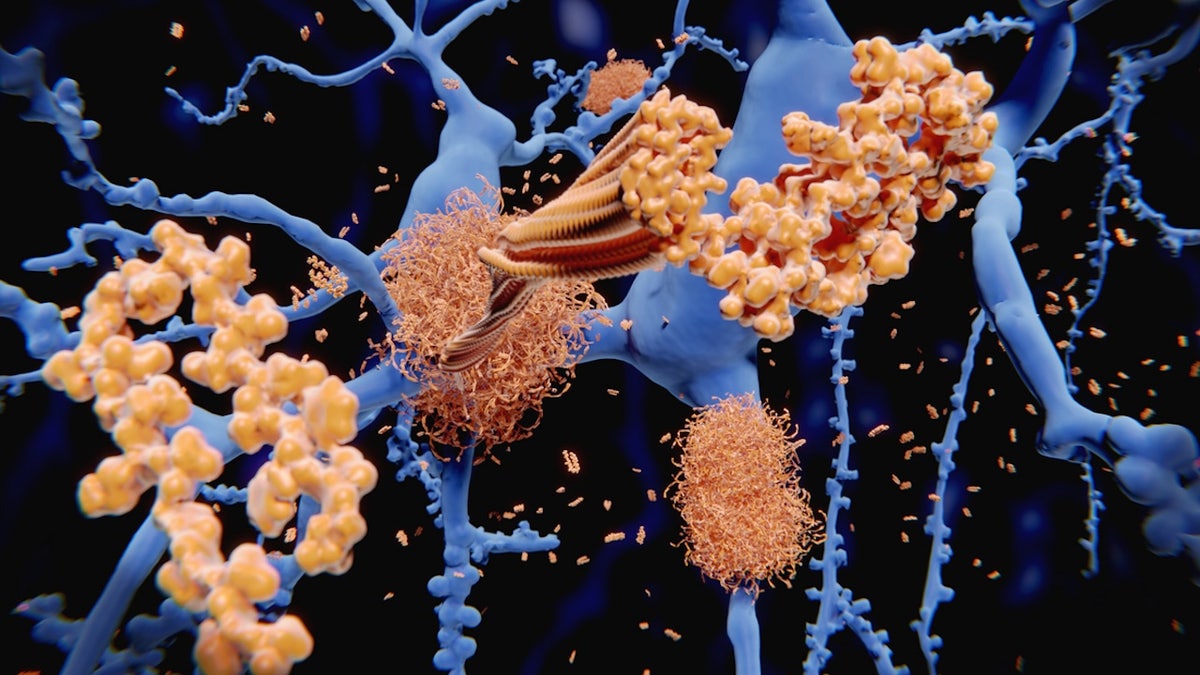Join Fox News for access to this content
Plus special access to select articles and other premium content with your account - free of charge.
By entering your email and pushing continue, you are agreeing to Fox News' Terms of Use and Privacy Policy, which includes our Notice of Financial Incentive.
Please enter a valid email address.
Two surprising new risk factors for Alzheimer’s disease are noted in a new study.
Untreated vision loss and high levels of LDL cholesterol have been linked to a greater chance of developing the common dementia type.
Low-density lipoprotein (LDL), which is sometimes called "bad cholesterol," is associated with negative health effects when present in high amounts.
HIGH BLOOD PRESSURE AND ALZHEIMER’S DISEASE COULD GO HAND IN HAND, STUDY FINDS
Researchers from University College London led the study, published in The Lancet on Aug. 10.
The findings were also presented at the Alzheimer’s Association International Conference (AAIC) in Philadelphia on July 31.

Untreated vision loss and high levels of LDL cholesterol have been linked to a greater chance of developing Alzheimer's. (iStock)
Vision loss and high LDL cholesterol join a list of 12 other risk factors the researchers previously identified in 2020.
Those 12 are hearing loss, lower education, smoking, hypertension, obesity, physical inactivity, depression, diabetes, excessive alcohol consumption, air pollution, traumatic brain injury and social isolation.
AI FAST-TRACKS DEMENTIA DIAGNOSES BY TAPPING INTO ‘HIDDEN INFORMATION’ IN BRAIN WAVES
To identify the two new risk factors, the researchers analyzed dozens of recent studies on vision loss and high cholesterol.
The 14 total factors are responsible for roughly half of dementia cases globally, the researchers stated, which means eliminating them could potentially prevent many cases.

About half of all Alzheimer's cases can be attributed to 14 total factors, the researchers stated. (iStock)
"Some dementia risk factors, such as alcohol consumption and physical exercise, can be managed by changing your lifestyle, but many must be addressed on a societal level," Fiona Carragher, chief policy and research officer at the Alzheimer’s Society in the U.K., said in a press release.
(The study was partly funded by the Alzheimer's Society.)
"Social isolation, education inequalities and air pollution are beyond individuals’ control and require public health interventions and joint action between government and industry."
"I tell patients all the time, ‘if it’s healthy for the heart, it’s healthy for the brain.’"
Dr. Earnest Lee Murray, a board-certified neurologist at Jackson-Madison County General Hospital in Jackson, Tennessee, was not involved in the study but said it "substantiates a lot of things we have known about dementia for several years."
He told Fox News Digital, "The study in Lancet shows higher levels of LDL (the bad cholesterol) — which is often related to diet and lifestyle choices — is related to a greater chance of developing a dementia process."

To prevent vision loss, the U.S. Centers for Disease Control and Prevention (CDC) recommends getting regular eye exams. (iStock)
"Genetic factors can play a role in elevated levels of LDL — however, even in these patients, diet modifications can be beneficial as well."
The neurologist was also not surprised by the link between vision loss and development of dementia.
ALZHEIMER’S AND PARKINSON’S RISK IS HIGHER FOR PEOPLE WITH BODY FAT IN TWO SPECIFIC AREAS
"We have known for years that patients who have higher levels of education and are ‘well-read’ often develop dementia at a much later age," Murray said.
"We rely heavily upon eyesight to be able to engage in our surroundings as well as stimulate cognitive thought."
Reducing the risk
In his practice, Murray said, he is often asked about ways to prevent or reduce the risk of developing dementia at a later age.
"Patients have a good understanding of what a heart-healthy diet and lifestyle look like," he told Fox News Digital.

Low-density lipoprotein (LDL), which is sometimes called "bad cholesterol," is associated with negative health effects when present in high amounts. (iStock)
The brain is a "very vascular organ," the doctor pointed out — which means it is closely linked to the heart.
"I tell patients all the time, ‘If it’s healthy for the heart, it’s healthy for the brain,’" Murray said.
ALZHEIMER’S BLOOD TEST DETECTS DISEASE WITH 90% ACCURACY IN ROUTINE DOCTORS’ APPOINTMENTS: STUDY
"This not only includes dietary changes, such as lower fat/lower cholesterol diets, but also lifestyle modifications, such as smoking and alcohol cessation."
There is also evidence that the Mediterranean diet can be beneficial in delaying the onset of dementia, Murray noted.

"Regular exercise is beneficial from a vascular standpoint, and can also help from a mental standpoint," a neurologist said. (iStock)
"Regular exercise is beneficial from a vascular standpoint, and can also help from a mental standpoint," he added.
Participating in cognitively stimulating activities is also known to delay the potential onset of dementia, according to Murray.
CLICK HERE TO SIGN UP FOR OUR HEALTH NEWSLETTER
"I tell my patients to find some cognitively challenging activity they enjoy, whether that's working puzzles or reading challenging books," he said.
"These activities can maintain a higher level of cognitive abilities and retard the onset of dementia."

Eating a diet rich in fruits and vegetables can help to protect vision and promote heart health, doctors say. (iStock)
To prevent vision loss, the U.S. Centers for Disease Control and Prevention (CDC) recommends getting regular eye exams, wearing protective eye wear in high-risk environments and wearing sunglasses to prevent exposure to UV rays.
CLICK HERE TO GET THE FOX NEWS APP
Knowing your family’s eye health history, eating a diet rich in fruits and vegetables, maintaining healthy blood sugar levels and avoiding smoking can also prevent vision loss, the agency added.
For more Health articles, visitwww.foxnews.com/health
Fox News Digital reached out to the study researchers and the Alzheimer’s Society for additional comment.